Do air pollution masks really work?
The Naked Scientists are joined by cosmologist Andrew Pontzen, biologist Sarah Shailes, neuroscientist Philipe Bujold and biochemist Sarah Madden to pit their wits against your science questions. This week, find out how venus fly traps work, whether psychologists can read your mind and why there is so much variation in herbivore poo.
In this episode
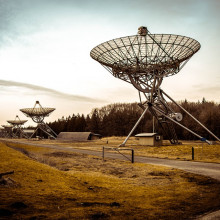
04:42 - If we had a telescope powerful enough to see all the way back to the Big Bang, what direction should we point it?
If we had a telescope powerful enough to see all the way back to the Big Bang, what direction should we point it?
We put Richard's question to University College London cosmologist Andrew Pontzen...
Andrew - Well, the great news is we pretty much do have telescopes that are powerful enough to see. Maybe not all the way to the big bang because right after the big bang the universe was sort of opaque so, if you try and go too far back towards the big bang, then you can’t see any further. But, just a few hundred thousand years after the big bang, the universe went transparent and light that was around at that time has remained within the universe, has been travelling ever since, remained within the universe and we can pick it up with telescopes today.
So this question of what direction should you point those telescopes in is a very good one, and the answer to the actual question is any direction. Because, although you might think of the universe as expanding out in a big bang from a tiny point actually, as far as we can tell, the entire size of the universe could be infinite. So, even if the universe has got an awful lot bigger since those very early days, even in the early days it was still infinite because, if you make infinite smaller, it’s still infinite. So it doesn’t really matter what direction you point a telescope in you are still looking in a direction that was there during the big bang.
Chris - Can you just elaborate a little bit on what you mentioned at the start when you said the universe was opaque and then it became transparent? What did you mean by that?
Andrew - If you imagine a very foggy day, you can’t see very far and the physics behind that is that any light that we call “light photons” - it comes in little packets of energy called photons, and those individual photons keep bouncing around. They are essentially bouncing off water droplets in the case of a foggy day. In the early universe, essentially it was the equivalent of a foggy day except it wasn't water droplets it was electrons, little particles called electrons that were making the light all bounce around. So, for that reason, you couldn’t see any further than this fog that you can’t see past.
Chris - Why did that clear, that fog?
Andrew - It cleared because as the universe expands it cools down and, when the universe gets cold enough, there’s not enough energy to keep those electrons flying around and they get dragged into protons and they start forming what we recognise today as atoms. So the electrons are no longer whizzing around and no longer able to intercept the light.

07:25 - Can you do a paternity test on a tree?
Can you do a paternity test on a tree?
eLife features editor Sarah Shailes took on Michael's seedy question...
Sarah - Yeah, we can actually. Like us, plants do produce children that have a mixture of genes from two parents so in that respect you do maternity/paternity testing. There are a few things that make that quite tricky with plants. So when we do paternity testing in humans we generally have a shortlist of people who could possibly be the father of the child so you are only testing a certain number of people’s DNA. With plants you can’t actually talk to them. Well, you can talk to plants but the don’t necessarily talk back.
Chris - Prince Charles does. He swears by it.
Sarah - I used to sometimes talk to my plants when I was working with them but they don’t generally… I just be looking at them wondering why they weren't being all nice and tidy when I needed them to be. I worked with a plant that crept all over the surfaces because it generally grows across the ground and you’d get tangled and get annoyed with them but they don’t generally answer when you ask them questions.
Chris - … funnily enough. But back to the family tree question then. You were saying that humans have a limited number of potential partners to trawl through but with trees, what are you saying, they’re a bit promiscuous and they’re sort of having sex in the air with so many other possible tree fathers that it’s very hard to work out who the dad is?
Sarah - Yes, exactly. Pollen can travel quite large distances. If you think of trees that are pollinated by insects, a bumble bee can travel a mile so you’d be looking at a whole bunch of trees in a mile radius potentially of the plant you’re interested in. But also seeds can travel quite a long way as well because seeds can survive for a long period of time and they can travel quite big distances.
Chris - Inside birds and things. Because birds will fly off and poop them out somewhere else and a new plant will grow there.
Sarah - Yeah, and you also get seeds being carried by the wind and all sorts of other ways. So you have a massive pool of potential mothers and fathers to work from. The other problem as well is that a lot of trees produce both pollen and eggs, so they’re both male and female. So even if you have narrowed it down to which plants you’re looking at it’s potentially going to be hard to tell whether they’re male or female.
Although it’s tricky to do maternity/paternity testing it plants, it is possible, especially in orchard situations. So, if you’re growing plants for breeding, you've got a bit better idea of what plants you’ve got in your orchards to do testing with. You can identify the top parents, so they’re the ones producing the best plants that you most interested in. This is also being used for conservation purposes with wild tree populations because you can use it to study how pollen moves and disperses within a wild population.

10:16 - How close are we to predicting people's choices by looking at their brains?
How close are we to predicting people's choices by looking at their brains?
Can we read minds? Philipe Bujold answered Elaine's question...
Philipe - The short answer is we are still very, very far from it. The long answer same thing - we are very far from this. The reason is quite simple: studying decision making is quite a recent process, especially in neuroscience, so we’ve only been looking at in depth for the last twenty, thirty, forty years.
We have an idea of ‘where’ things are happening but not ‘what’ is happening specifically. Let’s say the middle of your brain will be evaluating certain components of decision choices, so let’s say you need to choose between apples and pears. What is the value of apples; what is the value of pears? Then the front of the brain seems to be putting that into context, so the area right over your eyes which we call the orbitofrontal cortex. Then something happens under your forehead where choice, we think, happens and then something happens in the back. But, as you can see, we don’t really know unfortunately.
Chris - So it’s a really precise art then?
Philipe - Exactly. Well, that’s neuroscience unfortunately - it’s still budding. We think we know where things are happening but we can’t be certain.
Chris - But more specifically, if I were to sit in a brain scanner and think of certain things, could you on the basis of the pattern of activity in my brain when you show me pictures of trucks, know if you looked at my brain later when I was just randomly thinking about things and say, aha look, there was definitely a mental image of a truck going by there, or he’s thing about a person and a face? Could you do that?
Philipe - Unfortunately, unless you’re looking at very, very precise conditions, we are still not at that level. What we can do, however, is use economics and psychology and there are some reliable biases that we all have on average. So let’s say I am to promise you £3, you’d be very happy. If I promised you £5 and give you £3, which is the exact same amount, you’d be very upset. It’s the same thing but I can predict how you will feel because of that.
There is also things like probabilities. For some reason, humans seem to overvalue low ends so that’s why we pay the lottery; that’s why we get insurance for some very rare event. We know we do that kind of stuff and we can predict reliably what people will do, but that’s mostly economics and psychology. What we try to do is see cellularly what is happening and why it happens.

12:59 - Could meteorites from Earth end up on Mars?
Could meteorites from Earth end up on Mars?
Andrew Pontzen from UCL took on Brian's cosmic question...
Andrew - I think the answer is yes. There could certainly meteorites from Earth on Mars. Just for people who haven’t looked into this before, it is a fact that we have found meteorites that we are pretty confident have come from Mars right here on Earth. And the reason we think they’ve come from Mars is because we can study their chemical composition and so on, and we find that they just don’t have a chemical composition that’s typical of meteorites that are whizzing around in the solar system - not the normal meteorites. They have a chemical composition that matches that we know Mars has. So we are pretty confident that those things have come directly from Mars.
When you look at why? Why would there by chunks of mars landing here on Earth? You find out that the only sensible explanation for it is collisions of giant comets, or something like that, with Mars. Chips off a bit of Mars which then flies around a bit in the solar system for a few million years and, eventually, happens to find it’s way to Earth and it lands. Then it’s actually very useful because we can start learning stuff about Mars. And there’s absolutely no reason why the reverse process couldn’t have happened.
The thing to bear in mind though, especially if you’re interested in water say, is that the quantities of material involved here are absolutely tiny. You are talking about absolutely tiny amounts of stuff. So, even if a bit of water found it’s way from Earth to Mars through that route, it’s not going to be something that’s supporting little green men on Mars somewhere.
Chris - Well that’s a relief. Sarah Madden…
Sarah - Is it possible that life from Earth could get to Mars via the same kind of route by meteors?
Andrew - It’s entirely possible. I think a lot of people are thinking very seriously about where did life come from? Could it originate in space even? Or if it did originate here on Earth, could it then be transferred to other planets through space?
At first, a lot of people were hugely sceptical of this but, it is now known that here on Earth that there are bacteria that we call “extremophiles” that can survive in incredibly extreme environments. So, even though you’d think any living thing that was chipped off the Earth in some giant cataclysmic collision, and then flew around in space for a while, would surely die. Actually, maybe not. Maybe life could survive in those environments and could have found it’s way to Mars in exactly that way.
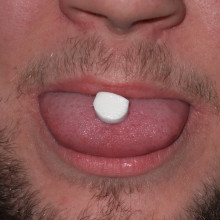
15:46 - Why do mints make your mouth feel cold?
Why do mints make your mouth feel cold?
Cambridge University's Sarah Madden took on Alan's cool question...
Sarah - It’s a very good question. The reason is that mints contain something called menthol and I have some mints with me here. Basically what happens is that the menthol in the mints hits a cold receptor that we have in our mouth. Obviously this receptor would normally be sensitive to temperature.
Chris - When you say cold receptor - what’s that?
Sarah - It’s a protein, so a unit in our mouth. It’s actually in the membrane; it’s like a channel. So what happens is sodium and calcium ions can go between it and this affects our nerves…
Chris - So it’s our nerve cells in your mouth?
Sarah - Yes. It affects nerve cells and then sends signals to our brain. So, basically, we eat menthol and this attaches to this receptor, and this sends a signal to our brain tricking us, making us think that our mouth is cold. Whereas, in fact, it’s just the menthol.
Chris - So, you’ve got cold sensing nerve fibres in your mouth. Now the opposite, of course, must be the chilli reaction isn’t it? Because I love curry and I’m very fond of the burn you get with a chilli and that’s where things feel artificially a lot hotter?
Sarah - That’s actually working by a very similar process. We have a different receptor, which is actually very similar to the mint one, and there’s a chemical in chillies called capsaicin. So what happens is again, that compound hits the receptor fooling your brain into thinking your mouth is on fire.
Chris - It certainly does, yeah.
Sarah - We were curious as to whether the two could cancel each other out? Because often you have mint yogurt when you have curry, for example, to try and cool them down.
Chris - Ohh what a good idea.
Sarah - I actually did some research into this.
Chris - Can we do the experiment. I notice you’ve brought some apparatus with you, which is a bag of menthol mints and you‘ve also got - what on earth is that? Is that a bag of of chillies?
Sarah - Yes, that’s right.
Chris - OK. I volunteer Philipe - no I’m just kidding. We should all do it. In the interests of having a good number of research participants, we should all have a go shouldn’t we?
Philipe - I’d just like to say, in the interest of science, this would be a bad decision - I’m just saying!
Chris - So what’s the experiment we’re going to try?
Sarah - We’ve done research in humans and mice to see if they counteract each other. Because, obviously, this is an illusion that’s happening in your mouth. It’s tricking your brain. They put these chemicals in the rat’s milk to see if they would have less or more.
Chris - So a mixture of menthol plus chilli to see if the hot effect makes the cold effect go away?
Sarah - Yeah. And, actually, it seems that it does.
Chris - Shall we find out?
Sarah - So, we’re going to see if it works on us as well.
Chris - Did you know that you guys that when you came in you were going to be doing this? She’s got a bag of raw chillies here. Do you like chilli Andrew?
Andrew - Not raw chilli. I think I might just hide at this point. Am I allowed to hide?
Chris - There’s chunks of whole chilli coming…
Andrew - With the seeds as well which are particularly bad, aren’t they?
Chris - I’ve got to do this as well.
Sarah - If you want to. And I’ve got some mints as well that you can pass around.
Chris - Here comes the mints. Are they maybe necessary?
Andrew - We’ve actually got giant chunks as well. Do we have to eat all of this?
Sarah - I'm not enforcing the entire chunk.
Chris - Sarah; this is a lot of chilli! This is a massive…
Andrew - We’ll not be able to speak for the remaining half an hour.
Sarah - The way it’s been proven in this paper, we should be very scientific. So we have to have the mint first because it’s been proven that it produces the cooling.
Chris - I’m eating the mint.
Andrew - Hang on a second. There’s no control sample here.
Chris - Just eat your mint and behave. Right, we’ve all chewed the mint… now what?
Sarah - You should be noticing our mouth is feeling slightly colder because of the menthol.
Chris - They taste nice. These are quite nice, I might get some more of these.
Sarah - Yeah. I’ve got the best for you guys you know.
Chris - They’re not good for your teeth though; it’s pure sugar I think.
Sarah - Now if we have the chilli. Having as much as you like.
Andrew - This is huge! Have I got to eat all of that?
Sarah - That’s extremely hot!
Andrew - Oh wow!
Chris - I eat very hot curries. But i’ve just eaten the whole thing and that’s quite hot.
Sarah - It’s much hotter than I thought it would be. We can see that it has actually reduced the coolness. Maybe slightly overpowered the coolness!
Chris - I think that’s just everyone losing consciousness, Sarah. I think we can say it doesn’t work on the basis of my personal…
Sarah - So the cold feeling is still…
Chris - It’s not working. My mouth is burning.
Sarah - But what it’s meant to do; it’s meant to reduce the cold effect. It doesn’t mean that it’s going to get…
Andrew - I did say that we didn’t have a control sample. We don’t know whether it works or not.
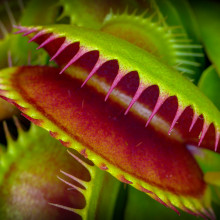
20:30 - How do venus fly traps work?
How do venus fly traps work?
Biologist and eLife features editor Sarah Shailes snapped up this question from David...
Sarah - If you look at the inside of venus fly trap there are actually really tiny, short, stiff hairs on the inside of the leaves. When an insect lands on the trap and they wander around on the surface of the leaf, they actually touch the hairs and this can cause the hairs to bend. If the insect touches two hairs in quick succession, or the same hair twice immediately after the other, then it triggers an electrical signal that runs through the leaf, and it actually causes the leaf to snap shut.
Chris - Where’s it get the electricity from?
Sarah - It’s quite similar to how electrical signals work in the brain. So you get ions moving across the membranes surrounding the cells carrying the electrical signal. The difference with plants is that they don’t have neurons but there are connections between the cells that allow the electrical signals to just go straight through, so that’s how it travels along.
Chris - Andrew…
Andrew - So given there’s sort of clearly a connection to the type of brain activity that we have, have those mechanisms evolved independently or are they actually related in terms of their genetic basis as well?
Sarah - That’s a really interesting question. They will have evolved independently but the channels in the membrane that allow the ions to move through, there can be similarities between them and they can work in quite similar ways. But they’re genetically different usually, plant ion channels.
Chris - So given that venus fly traps are green, and they’re therefore gathering energy from the Sun because they’re photosynthesising, why do they need to fish around in the air for flies to eat when they can just make their food from the Sun?
Sarah - The parts of the world that venus fly traps live in, although they do get some energy from sunlight, they are often in very nutrient poor areas. So by digesting the insects, they get a whole load of nutrients that they wouldn’t get from sunlight.

22:38 - Are humans unique in our way of thinking?
Are humans unique in our way of thinking?
Neuroscientists Philipe Bujold thought about this question from Alan...
Philipe - That’s a good one. I would have to say yes and no. Again a sort of half/half answer. The reason is yes, humans will be unique in certain ways. Obviously we have a brain that’s quite different to other animals; we have things like language. But if I look at pure economic decision making in that sense, we have very, very strong similarities with other animals in our lineage and it can go quite far back actually.
So let’s say things like fairness - monkeys will usually like things like fairness in the same way we do. Let’s say you give a grape to a monkey and then a cucumber to another one, usually the one that gets the cucumber will be very, very upset. And would prefer not to have anything and punish the person giving him the cucumber than other things.
You don’t necessarily see that in rats but as you go down you see all of the economic biases that we have slowly trickle down, although we still share a lot of things. So rats and pigeons will even share the effect of framing. Earlier I talked about the £3 versus £5. Well rats still show that, pigeons still show that. So yes, we have some unique biases but other animals share them too.

24:00 - Quiz: Which happened first?
Quiz: Which happened first?
with Andrew Pontzen, UCL, Sarah Shailes, eLife, Philipe Bujold, University of Cambridge, Sarah Madden, University of Cambridge
Chris Smith pits the panel against each other, with Andrew Pontzen and Sarah Shailes facing off against Philipe Bujold and Sarah Madden to win the coveted victory. This theme is very simple: you have to guess which event happened first. It’s as simple as that...
Andrew - Are we allowed to confer?
Chris - Yes. You two are on a team together so absolutely.
First one - Giza, that’s the pyramid of Giza predates the extinction of the Woolly mammoth... Do you think that’s true or false?
Sarah S - I think that’s false.
Andrew - Yeah. I suspect it’s false too. We’re going for false.
Chris - Most mammoths went extinct 10 000 years ago, but small groups are thought to have survived until only 4,000 years ago. So there were mammoths roaming the Earth at the same time as the pyramids were constructed!
So it’s nil points for team one so far. Philipe and Sarah M - lets see how you get on. You’ve got everything to play for.
What happened first? The evolution of the dinosaurs or the evolution of grass? And just to clarify because we have a drugs person here, that’s not cannabis we’re talking about, it’s the stuff that grows and we mow it with the lawnmower.
Sarah M - Well, they had grasses during the dinosaurs so.
Philipe - I have seen Jurassic Park and they did have grass.
Chris - So that’s a reliable source to go by: Jurassic Park.
Sarah M - Well, Wikipedia, Jurassic Park.
Chris - So you think that grass came first?
Philipe - I would say so.
Grass didn’t arrive until after the first dinosaurs were stomping around, but it did crop up before the dinosaurs went extinct.
Chris - So back to you Andrew and Sarah S.
What happened first the invention of the Fax machine or the discovery of Neptune? What do you two think about that? Which came first?
Sarah S - I’ve only used a fax machine once. I don’t know how long they’ve been around.
Andrew - I’m going to go for the discovery of Neptune.
Chris - You’re saying Neptune came first? The Fax machine actually predates the discovery of Neptune by two years! Neptune cropped up in 1846, the fax machine was 1843.
Andrew - I just don’t believe it, you’ve got Wikipedia...
Chris - Chairman’s decision is final. Zeroes so far and you get minus one for complaining - just kidding! Right, level pegging on zeroes still, let’s see if you can improve on this.
Philipe and Sarah which is older: sliced bread or wheels on suitcases?
Philipe - You’ve really got some good ones.
Sarah M - I think sliced bread came first. What do you think?
Philipe - Because I would say that yes, let’s go with that.
Chris - Victorians did a lot of traveling though, didn’t they.
Philipe - You made me eat a pepper so I will not trust you. I will go with the other one, yes.
Chris - You’re going with sliced bread - you are correct. Sliced bread dates from 1928, over 40 years before the patent for wheeled suitcases.
Chris - Back to Sarah S and Andrew… Which is older: Cambridge University or the Aztec empire?
Sarah S - Cambridge is over 800 years old. How old are the Aztecs?
Andrew - Surely older than that.
Sarah S - Oh. I don’t know because when the Spanish went over to South America they were still there, right? Aztecs maybe?
Andrew - That’s what I would have assumed...
Chris - You're going Aztecs right?
Andrew - No. Because we’re going for the opposite of what we think it would be. We’ll go for Cambridge University.
Chris - Cambridge University! Cambridge was founded in 1209, over 200 years before the rise of the Aztecs. Very even stevens here today. Both teams on one point. Right this is it - this is the decider. So Sarah M and Philipe...
Which is older: the theory of plate tectonics, or special relativity?
Philipe - I read something about plate tectonics recently. Other than the title I couldn’t tell you what it is.
Chris - It was a useful read then?
Philipe - Yeah, it was a very useful one.
Sarah M - I would assume special relativity. What would you?
Philipe - Have a go at plates. Just because I would assume special relativity.
Sarah M - OK. Do you want to go with that then?
Philipe - Are you OK with that one?
Sarah M - Yeah, I’m OK.
Philipe - Perfect.
Chris - I’m really sorry, special relativity in 1905 was proposed 10 years before the theory of continental drift and it was accepted about 40 years earlier!
Chris: So you both go home even stevens because you’ve both got one point. Very well done.
Andrew - I would have had the right answer to that one. I did actually know the answer to that one so could we have an extra half point and win.
Chris - I’ll think about it.
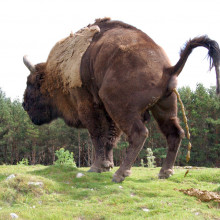
30:21 - Why is there so much variation in the poo of herbivores?
Why is there so much variation in the poo of herbivores?
Sarah Shailes answered this sticky question from John...
Sarah - It depends on several things really. Firstly it depends on what the herbivores are eating. There are a wide variety of herbivores that are eating all different things.
Fruits and seeds, for example, their nutrients are often easier to access than if you were eating leaves or stems, so the animal doesn’t have to do so much digesting. So that will affect what the poo looks like at the end.
Also, some plants are tougher to digest that other because they’ve got more fibre in them and so you’ll probably land up with more plant material at the other end. There is also chemicals inside some plants that will affect things as well. For example, apricots and prunes contain natural laxatives so if you’re herbivores eating lots of those that might make the poo a bit runnier.
But the other thing that affects it as well is the gut. Herbivores, like all animals, have bacteria in the gut that helps them to digest food and there’s a wide variety of different bacteria that help animals to digest food. That will also have an impact as well.
Chris - John specifically refers to cow pats. What can you say about those?
Sarah - Cows are a herbivore called ruminants, so like sheep as well. The way their guts are organised they have an extra chamber in their stomach called the rumen and that’s where they particularly house their bacteria. As to why cow pats look so different to sheep droppings… I am not entirely sure.
Chris - One vet put it to me once that people think cows eat grass but this is not true. Cows don’t eat grass, cows actually live on a soup of bacteria because they eat grass to feed the bacteria in their guts and the guts grow those bacteria which the cow then digests and it’s all very liquid and runny, isn’t it?

32:33 - Do those pollution masks actually work?
Do those pollution masks actually work?
We put Tracy's question to Sarah Madden, from Cambridge University... Sarah - That’s a really good question. It’s become more relevant as pollution in places like London has become quite bad recently and there’s over 10,000 deaths just in London and the UK every year. This kind of question becomes more and more relevant to us. Actually it’s kind of yes and no. Those face masks that you often see people having in Beijing (the surgeon’s masks) they do pretty much nothing. They aren’t airtight so they will pretty much let anything in and there’s not any point in using them. There are more advanced types of masks like gas masks that you're used to seeing… Chris - the fit tested masks? Sarah - Yeah that kind of thing. Chris - They do form a proper seal around your mouth. Sarah - They do stop particles getting in but often you can still breath in the gases and that can be a problem because nitrogen dioxide is one of the really harmful things in the polluted cities. It causes your lungs to become inflamed and causes you to develop bronchitis and that’s harder to block getting in than those find particles that you’d get. Andrew - So, as somebody who works in London next to one of the busiest, most polluted streets there is - it really is really bad. Is there anything that I can do that would help? Sarah - One of the best things you could do is almost to choose less congested routes. So if you were a cyclist go around the back streets if that’s possible. I think, if you have these masks, it can be quite hard to breath so it’s not good for cycling. Chris - We did make a programme on this last year, Andrew, and we actually sent one of our team to London to wander around various places wearing a set of sensors that were developed here in Cambridge and also at King's college in London to do ambulatory air quality monitoring. And the worst place in London we found was to get in a taxi because you’re in the thick of the traffic and all of the fumes are being pulled in from the car in front straight into the taxi and they can’t blow away because you’re in this sealed glass container. Best thing actually is to go down by the river, so take a stroll at lunchtime down by the Thames and it’s less polluted there we found. Actually, there’s even a difference between walking along the kerbside next to the road and if you move as far from the road edge as you can. So the advice would be avoid London, avoid getting in a cab in London, and go for a walk by the Thames if you want to. Sarah… Sarah - I was just wondering if any of those masks had any effect on microbes like bacteria or viruses because that’s what a lot of people often wear those masks for when they’re on the tube or something like that? Sarah - That’s a really good question. Microbes sit, in terms of size, in between a particle of dust you’d get from a car, and gas molecules are somewhere in between, and I guess it would be borderline whether they could stop that. Chris - Yeah. In hospital we don’t think they work when we use them for infection control because you often say let’s put a person who’s got an infection, let’s put one of those on them. And, as far as we know, as soon as they get wet because of breath dampening the material the bugs can go straight through and also, as you said Sarah, they’re not sealed round the edges. You just blow them all out the sides. Also, when people wear them to protect themselves they don’t protect your eyes and your eyes are connected to your nose, so all the bugs that land on your eyes get washed into your nose and affect you via that route. Sarah - Yeah. Chris - So you’re actually better off just staying at home and become a hermit. That’s the best solution.
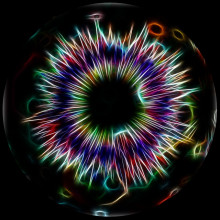
36:07 - Could the big bang be in an infinite repeating cycle?
Could the big bang be in an infinite repeating cycle?
UCL's Andrew Pontzen has a big answer for a big question...
Andrew - The idea of the big bang is that somehow, if you rewind the history of our universe, and we’re getting pretty good at doing this by piecing together all the evidence. If you rewind it
maybe 13.8 billion years into the past, then our universe was, essentially, infinitely dense or incredibly dense and the universe was born out of that primordial state.
I think what the question is getting at is what sets that up? How does something appear out of nothing that’s infinitely dense? What creates that? Of course, that’s a kind of question that’s been around forever. I think ever since humans first started asking any sort of philosophical question. The question of was there a single moment of creation or did somehow, the world that we know emerge from something else? The honest answer is we don’t know. We still don’t really know the answer to that question: what kicked off the big bang? We just don’t know.
We do have some ideas. There are things like this idea called “inflation,” which replaces the normal big bang picture with something slightly different where the universe expands in a really wierd way in it’s first tiny fraction of a second. And in that picture, it might well be quite natural that space and time have just existed forever. That there was not beginning to time and universes just kind of pop up within this bigger environment that we sometimes call the multiverse. So that, in a sense, there are theories that we’re trying to put to the test where time could have been around forever, and there could be this kind of idea of a repeating cycle.
Chris - That boggles your mind doesn't it? But you’re not going to give us an answer so we’ll have to say “the best I can do is say come back another time and we’ll do some experiments.”
Andrew - Yeah. It’s going right back to something that we discussed at the start of the programme. We can, actually, see light pretty much from the big bang itself. So we do live at a special time when we can actually tackle these questions scientifically, rather than just speculate about them. At the moment, what I just said is speculation but we do have ways that we’re trying to test it.

38:36 - Why are we so obsessed with new technology?
Why are we so obsessed with new technology?
Philipe Bujold from the University of Cambridge unpicked Vernon's question...
Philipe - I think that question applies to a lot more than new technology because it’s always what is the next big thing? What’s the new thing I can get? And that has, I would say, two main causes:
The first one is dopamine, which is a very in-fashion word at the moment. Dopamine seems, in the brain, to be coding things that would be considered a “surprise.” So be it a really good reward, a really bad reward, or something novel to you and, usually, you will seek what initiates that dopamine signal. So when dopamine is released, you just want more of that so you will keep seeking that. But at one point it stops being novel; it becomes your reference, if you want. So dopamine stops firing that extra little boost and so you want something more.
There’s also another reason to this; we are social animals and, unfortunately, we want to be like all the others. So when there’s iphones everywhere, well everybody wants iphones; when everybody wants androids, everybody wants androids. So you always want novelty but you also want what others have because you want to fit in. We are a social animal.
Chris - People who do buck the trend - what’s going on with them then? Are they doing that because that’s just their way of getting novelty because they're being different?
Philipe - That really depends. I guess the easy answer to that is that, obviously, everybody has genetic and environmental factors that will affect how they think. Some people will go against the trend, some people will go with it. Evolutionarily it makes sense that some people will go against the trend hoping maybe to establish a new trend, and being the first people there. There’s some reasons why people would do it but, on average, we do like to follow those trends.

Why do plants produce oil?
Sarah Shailes answered Hong's oily question...
Sarah - One of the main reasons they do it is to store energy. Like us, they use fats to store to store energy. Oils contain fats called triglycerides and they contain building blocks called fatty acids. They’re found particularly in seeds, for example, so the plants we use to commercially produce oils their seeds are particularly rich in oils. So peanuts, sunflower seeds, oil seed rape, that kind of thing.
But the fatty acids can also be incorporated into other molecules called phospholipids and these are found in the membranes surrounding plant cells, so the fatty acids there have a big role in controlling how fluid the membrane is and that’s really important for plant cells to work and all cells, in fact to work. They also have a role when the temperature changes in making sure that plane cells still function.
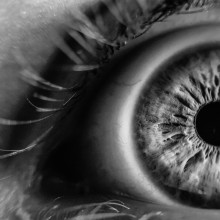
41:51 - Why do some drugs dilate your pupils?
Why do some drugs dilate your pupils?
Sarah Madden was wide-eyed answering Heather's question...
Sarah - The pupils are controlled by the muscles in our iris.
Chris - That’s the coloured bit isn’t it?
Sarah - That’s the coloured bit, yeah, that’s right. There’s two types: there’s one that’s a bit like spokes of a bicycle which causes your pupil to dilate (get bigger). And then there’s one which is called a sphincter (a bit like the muscle in your bum) which causes it to get smaller.
Chris - There’s a thought isn’t it - relating your eyes to your bum?
Sarah - It can happen in different ways for different drugs. When you have ecstacy this makes you very happy, which means it causes the release of a hormone called serotonin. This binds to - a word I’m using a lot today - a receptor in your brain and this carries on and causes your pupils to dilate (get bigger).
Chris - Philipe...
Philipe - Actually I think onto that, eyes also when you want to make a choice. If let's say you really want that apple and you don’t want that pear, your eyes will dilate more when you’re looking at the apple. And it’s the same thing when you’re trying to choose a mate. If you can see that, when you are aroused, your pupils are actually dilated. So look for that when you go on a date guys.
Chris - Sarah M…
Sarah - That’s a really good point. Scientists have started to wonder if they can read our minds through this pupil dilation. They did one experiment recently where the put a button in front of the participants and asked them to push in a 10-second interval. And they found they could predict when the participants were going to press it because their pupils dilated about one second before.
Chris - And that was the motivation?
Sarah - Yes, exactly. So they can hypothesise what’s going on but who knows what will happen in the future.

Why do chillies burn on the way out?
Chris Smith answered Vinnie's spicy question...
Chris - And the answer Vinnie is that anyone who has had a hot curry knows it is not confined purely to the mouth area. And the reason is that the nerves that sense the burning capsaicin in chilli peppers, they are present in your mouth and the other place where you have surface epithelium (your skin), and that’s your bum. So, you do feel it on the way in, and on the way out.

44:29 - Is the age of the Universe absolute or relative?
Is the age of the Universe absolute or relative?
Chris put Stan's question to cosmologist Andrew Pontzen...
Andrew - It is a deep question and the brief answer is no. We’re pretty sure that wherever we were in the universe we would measure the age as being the same but, as the question is saying, why should that be? We do know that the universe is kind of whizzing apart in some sense. We also know that Einstein’s special relativity tells us that if something is moving fast, it experiences time very differently and, in particular, you might well expect that it would experience much less time because it’s moving fast.
The way that you reconcile this is to apply not Einstein’s special relativity, but Einstein’s general relativity to the problem. General relativity was this kind of breakthrough in physics which combined the theory of special relativity, which came considerably earlier, with the problem of gravity. What is this mysterious force that seems to keep us glued to the Earth’s surface, and keeps the planets moving around, and the stars moving around the galaxies? The older theories of gravity, which were Newton’s theory, just couldn’t really be reconciled with Einstein’s special relativity, which had all these weird effects about clocks running at different rates for things moving at different speeds.
So general relativity was this theory that brought together gravity and special relativity and it means that once gravity becomes important, if you start thinking about situations where gravity is the most important force and that would include the expansion of the universe, then you can no longer apply the laws of special relativity. And, actually, if you correctly apply the laws of general relativity, you do get the correct answer that despite everything flying apart, everyone measures the same time having past.

47:11 - How do shops use neuroscience to convince you to buy something?
How do shops use neuroscience to convince you to buy something?
Neuroeconomist Philipe Bujold answered this question...
Philipe - Yes. So that’s usually the consideration that people want to look at, and it does make sense. There are a few things that people use and it’s not always just about neuroscience, it’s just certain psychological biases that we have, for example, sales. People could give you the exact same price, say it’s on sale, and you would still prefer it to the same object not on sale.
There is also things like choice. We think choices is better but, usually, more choices is not. It’s going to confer biases to specific options; it’s going to allow less of your neurons to apply themselves to one specific decisions and evaluate every possibility. So there’s a few different things like that that advertising and companies can do.
But the reverse end of that is that there’s a lot of good things we can also do with these biases. So, for example, let’s say climate change. People can look at these things and try to influence people’s behaviour and decisions with it so we are very susceptible to social pressures and social engagement. If you send someone a bill that says what the average energy consumption of household is, further little neighbour area, people are usually a lot more conscious of their choices and decisions than if you don’t, so there’s things like that. I’m sure there, at least people in Cambridge and London, and probably a few different places also, where you put eyes on ads saying don’t steal things. People are very conscious about eyes, so people will steal less if there’s eyes.
Chris - Does that work?
Philipe - Yep, it works, and it works in pretty much every situation.
Chris - Goodness. And do you find going shopping a tricky experience because you must see all this sort of neuromarketing going on and think I’m being duped, I’m being duped, I’m being duped, and it makes you really suspicious? Do you want to buy anything?
Philipe - I actually went shopping today and I have to say I felt…
Chris - Is that a new shirt? I was going to say that’s quite a good shirt that. Is that today’s purchase?
Philipe - It was on sale actually.
Chris - It was, OK?
Philipe - Obviously, humans or humans. Even though I know about certain biases we have, I still fall prey to them all the time and I think everybody in my field does the same thing. That’s why we’re so interested in it because we know we’re going to make the same mistakes over, and over, and over. But why do they happen?
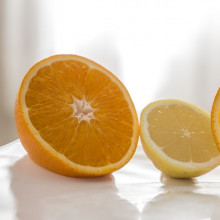
49:34 - Why does the same chemical smell different in oranges and lemons?
Why does the same chemical smell different in oranges and lemons?
Cambridge University's Sarah Madden sniffed out the answer to this question...
Sarah -They have the same chemical in them - limonene. It is truly the same chemical; it’s made up of the same atoms; it has the same bonds. But the difference is, the two versions that you find in oranges and lemons are actually the mirror image of each other. The way to think about this is to compare it to our hands. If we look at our hands we have two hands and they are the same but not, they are mirror images of each other.
What happens is that these two same, but different, chemicals interact with our nose differently. Again, we have receptors in our nose and because these compounds aren’t exactly the same it interacts differently with our receptors and we can smell the difference.
Chris - Right, OK. So you’ve got the same molecule except that it’s almost like I’ve shone it in a mirror and I’m looking at the mirror image molecule. Oranges have one form and lemons have the other but, when they go up your nose, because they are a bit like a right hand and a left hand, when they try and go into the receptor in your nose because that’s like a right hand going into a right handed glove, you can’t put a left hand in a right handed glove, at least not easily. Therefore, you smell one as one kind of smell because it’s registering with one group of receptors and one is a different smell because it’s registering with a totally different set of receptors.
Sarah - Yeah, that’s exactly right. It’s strange how such a small difference can have such a big effect on the body.
Chris - And in the drugs industry, this must be important because if you can make the same molecule and a chemist will tell you “yeah, I’ve made chemical A,” but I could have chemical A or chemical B, which is its mirror image, only one of those two forms might work in the body to kill cancer or do a job?
Sarah - Yeah, that’s really true. So often we have them as a mixture because it’s just basically as a chemist I know it’s so much easier and, therefore, so much cheaper to make it as a mixture of the two mirror images. But this can have effects on that you have a lot more side effects sometimes when you have the mixture. So you often find the really expensive medicine is the pure one form of the mirror image.

51:47 - Is gravity faster than light?
Is gravity faster than light?
Andrew Pontzen illuminated the answer to David's question...
Andrew - This is a beautiful question which I thought about for many years before figuring out what the answer is. Because, in Einstein’s theory of gravity (general relativity), nothing can travel faster than the speed of light. That’s one of the key components that goes into the theory before you even start. But, if you actually start analysing the equations quite carefully, they also have to agree with Newton’s theory of gravity pretty accurately. It has to be the case that since Newton’s theory of gravity works so well for describing things like the solar system and so on that it must be pretty much correct. Certainly in Newton’s theory of gravity, if the Sun were to disappear, then instantaneously we’d be flung out of orbit because there’d be no gravitational tug keeping the Earth in orbit around where the Sun used to be.
It is a bit strange - how does this get reconciled in Einstein's general relativity where nothing should travel faster than the speed of light, not even gravity itself. The answer is actually a bit of a disappointing one. It’s that Einstein's theory of gravity doesn’t even answer that question. It just refuses to answer the question because it has built into it at it’s centre and idea that energy can’t just be destroyed, and neither can mass. So you can’t take something like the Sun and say oh, it’s disappeared what happens next? The theory actually says no, that is just not allowed. So, if you try to make a calculation of what happens next, you’ll get all sorts of contradictory answers and things happening.
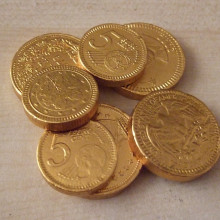
53:39 - Can neuroscience save you money?
Can neuroscience save you money?
Philipe Bujold has some good news for people with this problem...
Philipe - The answer is yes. There is a very unique psychological concept that I like to use a lot in my daily life, and that’s friction. Anything that is harder to do usually we will associate that with the cost and we will not do it.
Chris - So put more velcro on your wallet?
Philipe - Yeah. Stuff like that, obviously. But also, if you have a bank account that directly takes money for your savings, taking that money out of your savings is just that tiny bit of effort that you might not want to do. That’s why pension plans have money that goes in automatically because people have that friction to take it out. So that’s a really good way of doing it, or simply applying yourself in advance. Let’s say making sure and finding a means to promise to yourself that you will do it, so if you lock the money away completely - you can’t touch it. That’s a very good way of doing it! But, yeah, friction is probably the best way at the moment!










Comments
Add a comment